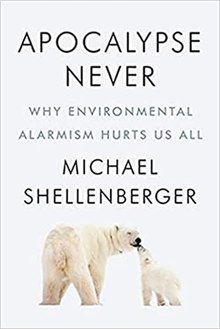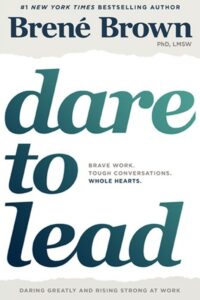This Week’s Selected Readings: Apocalypse Never, Dare to Lead
This week I finished

Apocalypse Never, by Michael Shellenberger: He seems sincere in his beliefs, but I kept thinking, “he’s close, but keeps not getting the issue.” For most of the book, I made mental notes of what to write about here that he missed, but I lost track after too many of them. Sorry, I’m not a professional book reviewer, so I’m not going to cover how much this book misses and misleads, but I see it as way off.
It seems like the book was designed 1) to paint environmentalists as shrill and acting on religious fervor, not reason and 2) to call nuclear clean. It’s so easy to paint your opponents as unreasonable and overzealous, everyone does it. I mean, he seems angry at them too. I won’t hold it against him, even though I don’t get what Extinction Rebellion is up to either.
He kept raising interesting points but then connecting them to the wrong issue. He would say deaths from natural disasters are decreasing, but the number of deaths in the past isn’t relevant to future problems.
A lot of people on one side of a particular strategy tend to show data that shows their opponents’ strategies fail, then erroneously conclude that their own strategy must then work. But nuclear and economic growth aren’t clean. Anyone who wants to understand can look at Tom Murphy’s textbook, blog, and Nature article.
I believe, if he’s true to his values, that he would agree to the approach in my book of preventing people from destroying life, liberty, and property, though I expect he would take a while to get there from where he is.
Anyway, I’m glad I read the book because I see his name around, but it looks based on misunderstanding and preconceptions. I’ll look into bringing him to the podcast.
Dare to Lead, by Brené Brown: I think that she does a great job of focusing on important issues and skills for leaders to understand and master, especially social and emotional skills like empathy, listening, and compassion. Also that she combines stories with research to make them compelling, assuming the research is accurate.
Still, I understand why, but still wonder why people working on leadership and helping people and organizations lead better don’t devote their work toward sustainability,. It’s one of humanity’s biggest problems and nearly devoid of leadership, which it needs the most. I’ll try to bring her to the podcast. If she applied her work to sustainability, she could be one of the most influential voices on it. But I understand the business world’s view on proposed solutions to environmental problems. That view promotes putting faith in “people smarter than me” or “young people” and other forms of blaming others and abdicating responsibility.
Back to the book, I’d recommend it, keeping in mind that reading about leadership is like reading about music. You may learn to appreciate it more, but not to play it. She also created online resources and exercises, so I’m not criticizing the book, only clarifying that to get significant benefit, you have to practice. I presume the exercises in the online resources are effective, I just haven’t reviewed them.

Read my weekly newsletter

On initiative, leadership, the environment, and burpees